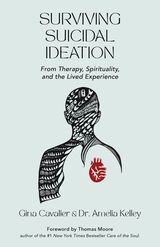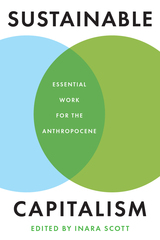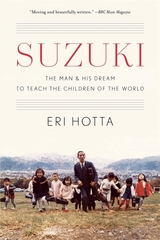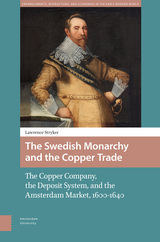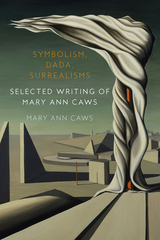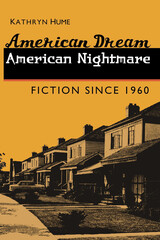
In breaking down the divisions among standard categories of race, religion, ethnicity, and gender, Hume identifies shared core concerns, values, and techniques among seemingly disparate and unconnected writers including T. Coraghessan Boyle, Ralph Ellison, Russell Banks, Gloria Naylor, Tim O'Brien, Maxine Hong Kingston, Walker Percy, N. Scott Momaday, John Updike, Toni Morrison, William Kennedy, Julia Alvarez, Thomas Pynchon, Leslie Marmon Silko, and Don DeLillo.
Hume explores fictional treatments of the slippage in the immigrant experience between America's promise and its reality. She exposes the political link between contemporary stories of lost innocence and liberalism's inadequacies. She also invites us to look at the literary challenge to scientific materialism in various searches for a spiritual dimension in life.
The expansive future promised by the American Dream has been replaced, Hume finds, by a sense of tarnished morality and a melancholy loss of faith in America's exceptionalism. American Dream, American Nightmare examines the differing critiques of America embedded in nearly a hundred novels and points to the source for recovery that appeals to many of the authors.
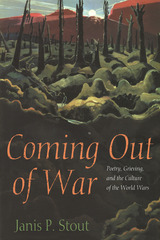
World War I is widely considered “the Great War” and World War II, “the Good War.” Janis Stout thinks of them as two parts of a whole that continues to engage historians and literary scholars searching for an understanding of both the actual war experiences and the modern culture of grief they embody. In Coming Out of War: Poetry, Grieving, and the Culture of the World Wars Stout argues that poetry, of all the arts, most fully captures and conveys those cultural responses.
While probing the work of such well known war poets as Rupert Brooke, Wilfred Owen, and Randall Jarrell, Stout also highlights the impact of the wars on lesser studied, but equally compelling, sources such as the music of Charles Ives and Cole Porter, Aaron Copland and Irving Berlin. She challenges the commonplace belief that war poetry came only from the battlefield and was written only by men by examining the wartime writings of women poets such as Rose Macaulay, Marianne Moore, Elizabeth Bishop, and Gwendolyn Brooks. She also challenges the assumption that World War II did not produce poetry of distinction by studying the work of John Ciardi, Karl Shapiro, Louis Simpson, Robert Frost, and Wallace Stevens. While emphasizing aesthetic continuity between the wars, Stout stresses that the poetry that emerged from each displays a greater variety than is usually recognized.
A final chapter considers Benjamin Britten’s War Requiem as a culmination and embodiment of the anti-war tradition in 20th-century poetry and music, and speculates on the reasons why, despite their abundance and eloquence, these expressions of grief and opposition to war have effected so little change.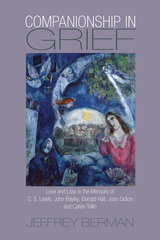
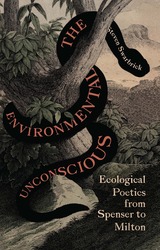
Bringing psychoanalysis to bear on the diagnosis of ecological crisis
Why has psychoanalysis long been kept at the margins of environmental criticism despite the many theories of eco-Marxism, queer ecology, and eco-deconstruction available today? What is unique, possibly even traumatic, about eco-psychoanalysis? The Environmental Unconscious addresses these questions as it provides an innovative and theoretical account of environmental loss focused on the counterintuitive forms of enjoyment that early modern poetry and psychoanalysis jointly theorize.
Steven Swarbrick urges literary critics and environmental scholars fluent in the new materialism to rethink notions of entanglement, animacy, and consciousness raising. He introduces concepts from psychoanalysis as keys to understanding the force of early modern ecopoetics. Through close readings of Edmund Spenser, Walter Ralegh, Andrew Marvell, and John Milton, he reveals a world of matter that is not merely hyperconnected, as in the new materialism, but porous and off-kilter. And yet the loss these poets reveal is central to the enjoyment their works offer—and that nature offers.
As insightful as it is engaging, The Environmental Unconscious offers a provocative challenge to ecocriticism that, under the current regime of fossil capitalism in which everything solid interconnects, a new theory of disconnection is desperately needed. Tracing the propulsive force of the environmental unconscious from the early modern period to Freudian and post-Freudian theories of desire, Swarbrick not only puts nature on the couch in this book but also renews the psychoanalytic toolkit in light of environmental collapse.
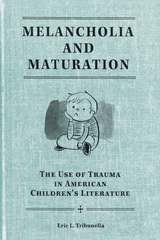
“Coming of age” in children’s fiction often means achieving maturity through the experience of trauma. In classics ranging from Old Yeller to The Outsiders, a narrative of psychological pain defies expectations of childhood as a time of innocence and play. In this provocative new book, Eric L. Tribunella explores why trauma, especially the loss of a loved object, occurs in some of the most popular and critically acclaimed twentieth-century American fiction for children.
Tribunella draws on queer theory and feminist revisions of Freud’s notion of melancholia, which is described as a fundamental response to loss, arguing that the low-grade symptoms of melancholia are in fact what characterize the mature, sober, and responsible American adult. Melancholia and Maturation looks at how this effect is achieved in a society that purports to protect youngsters from every possible source of danger, thus requiring melancholia to be induced artificially.
Each of the book’s five chapters focuses on a different kind of lost object sacrificed so as to propel the child toward a distinctively gendered, sexual, ethical, and national adulthood—from same-sex friends to the companionship of boy-and-his-dog stories, from the lost ideals of historical fiction about the American Revolution to the children killed or traumatized in Holocaust novels. The author examines a wide spectrum of works—including Jack London’s dog tales, the contemporary “realistic” novels of S. E. Hinton, and Newbery Medal winners like Johnny Tremain and Bridge to Terabithia.
Tribunella raises fundamental questions about the value of children’s literature as a whole and provides context for understanding why certain books become required reading for youth.
Eric L. Tribunella is assistant professor of English at the University of Southern Mississippi. His articles have been published in Children’s Literature Association Quarterly, Children’s Literature in Education, The Lion and the Unicorn: A Critical Journal of Children’s Literature, and Children’s Literature.
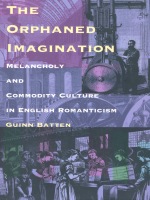
Building on the theoretical insights of Slavoj Zizek, Judith Butler, Julia Kristeva, and Eve Kosofsky Sedgwick, Batten interweaves the discourses of psychoanalysis, economics, biography, sexuality, melancholy, value, and exchange to question accepted ideas of how Romantic poetry works. She asserts that poetic labor is in fact paradigmatic of the kinds of production—and the kinds of desire—that capitalist culture renders invisible. If symbolic exchange, in cash or in words, requires the surrender of a beloved object, if healthy mourning requires an orphan to “work through” emotional loss through the consolation of art or a love for the living, then the rebellious Romantic poet, Batten contends, possessed unique insight into the alternative authority of a poetic language that renounced a culture of denial. Batten urges that scholars move beyond critical approaches condemning allegedly regressive forms of pleasure, recognizing that they, too, are haunted by melancholic attachments to dead poets as they conduct their work.
The Orphaned Imagination will interest anyone concerned with the claims of the English Romantic poets to a distinctive, valuable form of knowledge and those who may wonder about the power of contemporary theory to illuminate a traditional field.
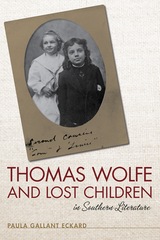
—Margaret M. Bauer, Rivers Chair of Southern Literature at East Carolina University
First published in 1937, Thomas Wolfe’s The Lost Boy gives name to the theme of lost children that has permeated much of southern literature and provides a template for telling their stories. In Thomas Wolfe and Lost Children in Southern Literature, which grew out of many years of teaching The Lost Boy and other works of southern literature, Paula Gallant Eckard uses Wolfe’s novel as a starting point to trace thematic connections among contemporary southern novels that are comparably evocative in their treatment of lostness.
Eckard explores six authors and their works: Fred Chappell’s I Am One of You Forever, Mark Powell’s Prodigals, Kaye Gibbons’s Ellen Foster, Sue Monk Kidd’s The Secret Life of Bees, Bobbie Anne Mason’s In Country, Robert Olmstead’s Coal Black Horse, and Lee Smith’s On Agate Hill. Though each novel is unique and a product of its own time period, all the novels explored here are cast against the backdrop of the South during eras of conflict and change. Like The Lost Boy, these novels reflect a sense of history, a sense of loss associated with that history, and an innate love of story and narrative, as well as representations of work that historically have defined the lives of individuals and families throughout the South.
In its artistic treatment of lostness, The Lost Boy creates a significant literary legacy. As Eckard demonstrates, that legacy continues in the form of these six contemporary authors who, in writing about the South, perpetuate Wolfe’s efforts as they also create or find the lost child in new ways.
PAULA GALLANT ECKARD is an associate professor of English and the director of the American studies program at the University of North Carolina at Charlotte. She is the author of Maternal Body and Voice in Toni Morrison, Bobbie Ann Mason, and Lee Smith.
READERS
Browse our collection.
PUBLISHERS
See BiblioVault's publisher services.
STUDENT SERVICES
Files for college accessibility offices.
UChicago Accessibility Resources
home | accessibility | search | about | contact us
BiblioVault ® 2001 - 2024
The University of Chicago Press


